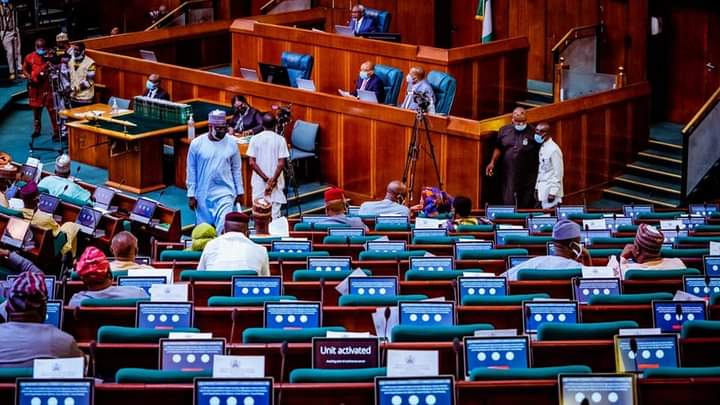The ninth national assembly, in 2019, commenced a process to amend the 1999 constitution.
On Tuesday, the senate and house of representatives voted on bills to amend the constitution.
But the process is not in its concluding phase just yet.
Below is a breakdown on what more steps are needed for the constitution amendment to take effect.
Advertisement
WHAT IS CONSTITUTION AMENDMENT?
Constitution amendment is a formal modification to the text of the written constitution of a nation or state to correct or revise the original content to suit the interest of the nation or state.
The Nigerian constitution makes provision for it to be amended when there is a need to do so.
Advertisement
WHAT HAS THE NATIONAL ASSEMBLY DONE SO FAR?
The proposals for the amendment of the constitution came in the way of bills — originating from lawmakers and the executive.
The bills were then sent to the respective (senate and house of representatives) rules and business committees and were scheduled on the order paper.
The full titles were read out for first reading at the bills’ presentation, which signified the start of the legislative process.
Advertisement
The bills were read the second time and their general principles were debated during plenary, after which they were referred to the ad hoc committees on constitution amendment of both chambers.
The bills were reviewed by the committees, and zonal public hearings were organised across the six geo-political zones. At this stage, stakeholders made salient contributions through the submission of proposals.
The committees subsequently met with consultants and decided which proposed amendments to adopt or reject. Afterwards, the reports on the bills were submitted at plenary sessions and adopted.
The lawmakers then voted on each specific item on the bills. Here, the proposals to amend the constitution were presented in the form of clauses.
Advertisement
The house of representatives has a total of 360 members, while the senate has 109 members.
On Tuesday, both chambers voted separately on 68 constitution amendment bills. The legislators used e-voting and not the voice-vote method often employed for the passing of bills and motions.
Advertisement
The use of e-voting was to meet the requirements of sections 9(2) and (3) of the constitution which outlines the procedure for altering the provisions of the constitution.
The purpose of this was to ensure that the total number of senators or house of representatives members in attendance did not fall below the minimum number required to adopt a proposed clause, and that any proposal that was passed met the two-third majority approval criterion.
Advertisement
Section 9(2) of the constitution requires two-third votes of each chamber of the national assembly, while section 9(3) imposes a higher requirement of a four-fifth majority where the amendments involve boundary adjustments, creation of new states, new local government areas, fundamental rights, or the mode for altering the constitution.
Section 9(1) of the constitution reads: “The National Assembly may, subject to the provision of this section, alter any of the provisions of this constitution.
Advertisement
“(2) An Act of the National Assembly for the alteration of this Constitution, not being an Act to which section 8 of this Constitution applies, shall not be passed in either House of the National Assembly unless the proposal is supported by the votes of not less than two-thirds majority of all the members of that House and approved by resolution of the Houses of Assembly of not less than two-thirds of all the States.
“(3) An Act of the National Assembly for the purpose of altering the provisions of this section, section 8 or Chapter IV of this Constitution shall not be passed by either House of the National Assembly unless the proposal is approved by the votes of not less than four-fifths majority of all the members of each House, and also approved by resolution of the House of Assembly of not less than two-third of all States.”
The votes were then collated and counted after electronic voting.
TheCable had reported how the legislators in both chambers chambers voted.
It is important to note that there were some amendments to the bills.
WHAT’S NEXT?
Both chambers will set up a conference committee to harmonise the differences in the proposed amendments. This is because the two chambers are required to pass constitution amendment bills in identical format.
If both chambers are not able to harmonise the differences, the bills will be returned to the respective houses of the national assembly for fresh voting.
After harmonisation, the bills are then transmitted to the state houses of assembly by the clerk of the national assembly for their concurrence.
According to the aforementioned sections 9(2) and (3), two-thirds of all the state assemblies need to approve the bills — that is 24 states will be required for each amendment to be approved.
When two-thirds of the state assemblies approve each clause by simple majority, the returns are then made to the national assembly.
According to section 58 of the constitution, bills require the assent of the president.
There is, however, the debate on whether the bills returned from the states automatically come into effect or if they should be sent to the president for his assent.
If the president declines assent to the bills, section 58 of the constitution empowers the national assembly to pass the bills through a two-third majority.
Also, the cycle of the amendment process ends after each legislative tenure.
As a result, this process of amending the constitution cannot go beyond the ninth assembly, nor can deliberations on the current revisions continue when a new assembly is inaugurated.






